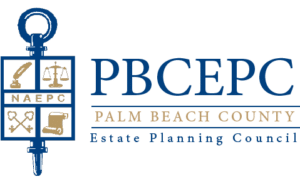
Effective July 1, 2021, Florida enacted the “Community Property Trust Act” (the “Act”) which now enables married couples to take advantage of certain planning benefits not previously afforded to Florida residents. The Act allows married couples to “opt-in” to community property treatment for assets held in a Florida Community Property Trust, provided the trust meets certain statutory requirements. So, what is the benefit of owning community property?
Florida, like a majority of states, is a separate property state with regard to ownership of property by married couples. Alternatively, there are nine community property states: Arizona, California, Idaho, Louisiana, Nevada, New Mexico, Texas, Washington, and Wisconsin. In community property states, all property owned by a married person is either deemed community property or the separate property of one spouse. In addition, any property acquired during marriage is presumed to be community property unless there is clear and convincing evidence that the property is the separate property of one spouse. Although Florida, and some other states, permit married couples to own property as “tenants by the entirety,” this form of property ownership has vastly different characteristics than property categorized as community property. Two of the main differences between tenants by the entirety property ownership in Florida and community property ownership is that tenants by the entirety provides rights of survivorship and asset protection benefits. With respect to rights of survivorship, with tenants by the entirety, when one spouse dies, the legal title to the property automatically passes to the surviving spouse. Alternatively, with community property, in general, spouses have the right to devise their shares of the property as they wish by will or trust. With respect to creditor protection, Florida law provides that tenants by the entirety property is protected from a creditor of either spouse. In general, with community property, one-half of the community property may be exposed to one spouse’s creditors.
However, community property has a significant income tax benefit that is not afforded to tenants by the entirety, or any other jointly owned property. Section 1014(b)(6) of the Internal Revenue Code provides that all community property assets, including the surviving spouse’s interest in community property, receives a full step-up in basis upon the death of the first spouse. This income tax treatment is specific to property held by a decedent and a surviving spouse under the community property laws of any state. As such, the principal benefit to establishing a Florida Community Property Trust is to obtain this “full step-up in basis” treatment upon the death of the first spouse.
Florida Statute §736.1511 specifically provides that for purposes of the application of Section 1014(b)(6) of the Internal Revenue Code, as of January 1, 2021, a Community Property Trust is considered a trust established under the community property laws of the state. In addition, Florida Statute §736.1503 sets out the following specific requirements in order for a trust to qualify as a Community Property Trust under the Act: (1) the trust expressly declares that the trust is a Community Property Trust within the meaning of the Act; (2) the trust has at least one trustee who is a “qualified trustee” (defined in Florida Statute §736.1502 as a resident of Florida or a company authorized to act as a trustee in Florida), provided that both spouses or either spouse also may be a trustee; (3) the trust is signed by both settlor spouses consistent with the formalities required for the execution of a trust under Chapter 736; and (4) the trust contains substantially the following language in capital letters at the beginning of the Community Property Trust agreement: THE CONSEQUENCES OF THIS COMMUNITY PROPERTY TRUST MAY BE VERY EXTENSIVE, INCLUDING, BUT NOT LIMITED TO, YOUR RIGHTS WITH RESPECT TO CREDITORS AND OTHER THIRD PARTIES, AND YOUR RIGHTS WITH YOUR SPOUSE DURING THE COURSE OF YOUR MARRIAGE, AT THE TIME OF A DIVORCE, AND UPON THE DEATH OF YOU OR YOUR SPOUSE. ACCORDINGLY, THIS TRUST AGREEMENT SHOULD BE SIGNED ONLY AFTER CAREFUL CONSIDERATION. IF YOU HAVE ANY QUESTIONS ABOUT THIS TRUST AGREEMENT, YOU SHOULD SEEK COMPETENT AND INDEPENDENT LEGAL ADVICE. ALTHOUGH NOT A REQUIREMENT, IT IS STRONGLY ADVISABLE THAT EACH SPOUSE OBTAIN THEIR OWN SEPARATE LEGAL COUNSEL PRIOR TO THE EXECUTION OF THIS TRUST.
The “opt-in” feature of the Act permits Florida residents (and potentially residents of other states) to establish a Community Property Trust and qualify the assets held therein as community property. This could be a powerful income tax planning tool for the right clients and situation. Married couples interested in income tax planning with a Community Property Trust should speak with their tax advisor about the benefits and limitations of such planning.
Lisa A. Schneider practices in Gunster’s West Palm Beach office and leads Gunster’s Trusts & Estates practice, co-chaired the firm’s Women’s Leadership Forum, and co-chairs the firm’s mentorship program. She focuses her practice on counseling families as to wealth preservation and transfer tax techniques, with a focus on planning for complex family structures and business succession. Lisa was selected by the Robb Report’s WORTH Magazine as one of the “Top 100 Attorneys” in the United States and has been ranked by Chambers High Net Worth Guide for private wealth law.
Joshua N. Goldglantz practices in Gunster’s Boca Raton office, and is a member of the firm’s Private Wealth Services group. As an attorney board certified in wills, trusts and estates, Joshua concentrates his practice in the areas of tax, estate planning and asset protection planning for high net worth individuals and families.
